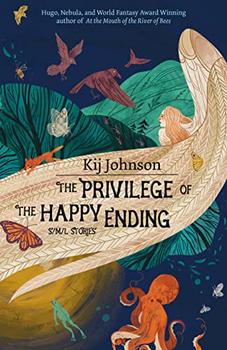Summary | Excerpt | Reviews | Beyond the Book | Read-Alikes | Genres & Themes | Author Bio

Small, Medium, and Large Stories
by Kij JohnsonThis article relates to The Privilege of the Happy Ending
.jpg) One of the short stories in Kij Johnson's The Privilege of the Happy Ending lists whimsical interpretations of specific dreams. For instance, to dream about an Audi "signifies great strife and financial disaster. It is hard not to connect this to the fact that your ex left you for someone who owns an Audi."
One of the short stories in Kij Johnson's The Privilege of the Happy Ending lists whimsical interpretations of specific dreams. For instance, to dream about an Audi "signifies great strife and financial disaster. It is hard not to connect this to the fact that your ex left you for someone who owns an Audi."
But the interpretation of dreams is not and has not always been taken lightly. The practice dates back to ancient times and has been a topic of discussion and debate in psychological circles in more modern eras. Throughout the ages, various cultures have held their own particular beliefs about the significance of dreams.
Dream interpretation was performed in ancient Mesopotamian, Roman and Egyptian societies, among others, and was often linked with spiritual beliefs. In the Book of Genesis, the character of Joseph rises to prominence in Egypt through his interpretation of prophetic dreams.
The modern, popular idea that dreams hold meaning was established in part by Sigmund Freud, the founder of psychoanalysis, at the turn of the twentieth century. Rather than interpreting dreams through a mythical lens, Freud believed they shed a light on the dreamer's subconscious. He proposed that the imagery seen in dreams was a distorted representation of a person's unconscious motivations and desires, which could be untangled through psychoanalysis.
In the 1970s, British psychologist Ann Faraday brought dream interpretation into the DIY realm. Like Freud, she believed dreams held secret meanings, and in her books Dream Power and The Dream Game, she suggests that individuals have the power to unlock them. She encourages readers to keep dream diaries and look for recurring motifs.
Also in the 1970s, Harvard psychologists J. Allan Hobson and Robert McCarley began
developing the activation-synthesis hypothesis, which suggests that dreams are a byproduct of the brain signals fired during REM sleep. According to this theory, the cerebral cortex creates a dream in an attempt to make sense of these seemingly random inputs.
While this sort of neuroscientific speculation casts doubt on Freud and Faraday's beliefs that dreams reveal the secrets of our unconscious, that idea has never fully left the popular imagination. You can browse the commonly accepted meanings of dreams using sites like Dream Moods or Dream Dictionary. And in a very modern twist, the tool Dream Interpreter AI promises to make sense of your specific dream using artificial intelligence. Whatever the future of dream interpretation holds, it seems clear that many will remain fascinated with trying to crack the code.
Joseph Interprets Pharoah's Dream by Nicolas Poussin (1594–1665), via SMK Open
Filed under Cultural Curiosities
![]() This article relates to The Privilege of the Happy Ending.
It first ran in the November 1, 2023
issue of BookBrowse Recommends.
This article relates to The Privilege of the Happy Ending.
It first ran in the November 1, 2023
issue of BookBrowse Recommends.
Dictators ride to and fro on tigers from which they dare not dismount. And the tigers are getting hungry.
Click Here to find out who said this, as well as discovering other famous literary quotes!
Your guide toexceptional books
BookBrowse seeks out and recommends the best in contemporary fiction and nonfiction—books that not only engage and entertain but also deepen our understanding of ourselves and the world around us.